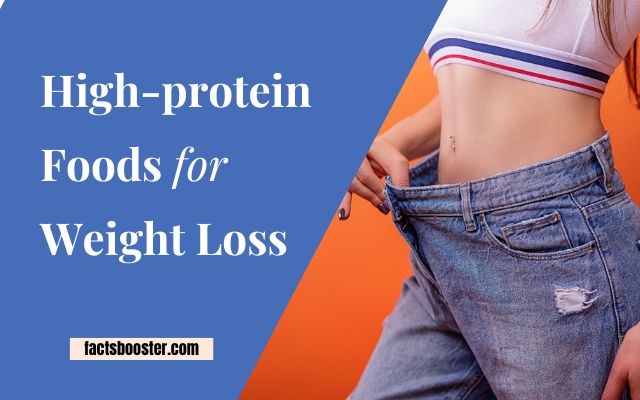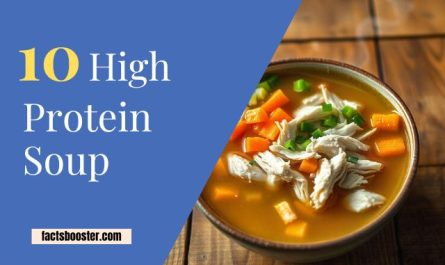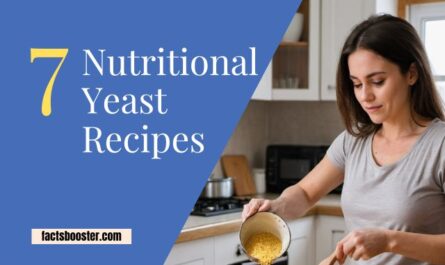So, you’re ready to take on weight loss but find yourself bombarded with an array of diets? Let me tell you about the silent hero that might just be your ticket to success: high-protein foods for weight loss!
Integrating high-protein foods into your diet isn’t just a fad; it’s a science-backed strategy aimed at enhancing fat loss while preserving precious muscle mass.
The beauty of high-protein intake lies in its power to boost metabolism and increase satie ty, making it a cornerstone for effective weight management.
Key Takeaways:
- High-protein foods are pivotal for effective weight loss, enhancing fat loss while maintaining muscle.
- Protein boosts metabolism and increases feelings of fullness, aiding in appetite control.
- Daily protein intake should be calculated based on individual body weight and activity level for optimum results.
High-Protein Foods for Weight Loss – Why Is It Important?

So, you’re diving into the world of weight loss and have heard that high-protein foods are the way to go. But why exactly is protein so crucial? Let’s break it down.
Protein is not just a buzzword; it’s a key player in managing body composition and keeping those hunger pangs at bay. When you focus on high-protein foods, you’re essentially fueling your body with the necessary amino acids that help in muscle gain and preservation, especially important when you’re shedding pounds.
But there’s more – protein has this incredible ability to boost your metabolism and increase satiety. That means you’re likely to feel fuller for longer periods, making it easier to stick to your nutritional balance without giving in to cravings.
Incorporating foods like lean meats, dairy, legumes, fish, and eggs into your dietary plan doesn’t just fuel your body; it aligns with healthy eating principles that emphasise satiation and metabolic perks.
Top High-Protein Foods for Weight Loss
- Lean meats: Think chicken breast, turkey, and lean cuts of beef – they pack a protein punch with minimal fat.
- Dairy: Greek yogurt, cottage cheese, and milk not only offer high-quality protein but also calcium for bone health.
- Legumes: Beans, lentils, and chickpeas are not just protein-rich; they’re also loaded with fiber to keep you full longer.
- Fish: Salmon, tuna, and trout provide omega-3 fatty acids along with protein, supporting both weight loss and heart health.
- Eggs: Versatile and affordable, eggs are a great source of protein plus essential vitamins and minerals.
- Protein-rich snacks: Almonds, Greek yogurt, and cottage cheese make excellent snack options to fuel your day.
Read more:
Protein’s Impact on Weight Loss
When you embark on a journey to shed those extra pounds, incorporating high-protein foods into your diet can be a game-changer. Protein, the building block of muscles, plays a critical role in weight loss, primarily through metabolism boost and increased satiety.
Consuming foods rich in protein can significantly enhance the number of calories you burn by boosting your metabolic rate. This happens because the body expends more energy—aka calories—to digest protein compared to fats or carbs.
Additionally, protein-rich meals make you feel fuller for longer, effectively curbing those pesky hunger pangs and reducing your overall calorie intake. Whether it’s lean meats, dairy, legumes, fish, or eggs, adding these to your diet can support your weight loss efforts while helping maintain muscle mass for a toned look.
Embracing a high-protein meal plan is not just about weight loss; it’s about making a sustainable shift towards healthier eating habits while ensuring nutritional balance.
Protein’s Role in Boosting Metabolism
When you fuel your body with high-protein foods, you’re not just satisfying hunger — you’re setting your metabolism on fire. Here’s how it works: Consuming lean meats, fish, legumes, and dairy necessitates more energy from your body to digest.
This process, known as the thermic effect of food, means that protein-rich meals can increase your metabolic rate more so than carbs or fats. Essentially, your body works harder, burning more calories in the process, to break down those amino acids.
So, not only are you working towards weight loss, but you’re also giving your body composition a favorable nudge towards muscle gain. (1)
How Protein Enhances Satiety
Ever wondered why you feel more satisfied after a steak dinner compared to a big bowl of pasta? The secret lies in the extraordinary powers of protein. It’s not just about muscle gain; protein plays a pivotal role in how full you feel after eating.
When you opt for high-protein foods, your body takes its sweet time digesting them. This slower digestion process means you’re less likely to raid the snack drawer an hour after dinner.
Plus, protein affects your hunger hormones, like ghrelin, telling your brain, “Hey, I’m full here!” It’s this double-whammy approach – slowing down digestion and influencing hunger hormones – that makes protein a heavyweight champion in enhancing satiety.
So, whether it’s lean meats, dairy, legumes, fish, or eggs, incorporating these protein-rich foods into your meals can help keep those pesky hunger pangs at bay and support your weight loss journey.
Increase Muscle Mass and Reduce Bone Loss
When you’re on a journey to shed some pounds, your body shouldn’t just be losing fat, but also fighting to maintain precious muscle mass. This is where high-protein foods step into the limelight.
Proteins, packed with essential amino acids, are the building blocks your muscles crave, especially after those invigorating workouts aimed at weight loss. They not only help repair and grow muscle tissue but also safeguard against the dreaded bone loss.
Why is this combo a big deal? Well, more muscle mass revs up your metabolism, making your body a more efficient calorie-burning machine, even at rest. Meanwhile, stronger bones mean a sturdier framework and reduced risk of osteoporosis, keeping you active and injury-free as you slim down.
In short, protein-rich meals like lean meats, dairy, legumes, fish, and eggs are your allies in achieving that toned, healthy body you’re working towards.
Daily Protein Needs
Wondering how much protein you actually need to support your weight loss and muscle gain goals? It’s simpler than you might think. Start by calculating your daily protein intake based on your body weight.
A good rule of thumb is to consume about 0.8 grams of protein per kilogram of body weight for a sedentary lifestyle (2). However, if you’re more active or aiming for metabolism boost and increased muscle mass, bumping it up to 1.2 to 2.0 grams per kilogram can propel you towards your goals.
Remember, achieving that nutritional balance is key to healthy eating and optimizing your body composition.
A High-Protein Meal Plan for Weight Loss
Revamping your daily menu to include high-protein foods can significantly boost your weight loss efforts. Let’s dive into a simple, yet effective high-protein meal plan.
Breakfast: starting your day with a spinach and feta omelet with a side of turkey bacon. This kickstarts your metabolism and keeps you fuller for longer.
Lunch: a quinoa salad tossed with chickpeas, diced bell peppers, and a drizzle of olive oil packs a protein punch while keeping things light and flavorful.
Dinner: grilled salmon with a side of steamed broccoli and sweet potato offers a comforting end to the day, with ample protein to aid muscle repair overnight.
Don’t forget snacks; Greek yogurt or a handful of almonds are perfect for staving off hunger cravings between meals. This meal plan is not just about shedding pounds; it’s a pathway to better health and energy.
Potential Risks of a High-Protein Diet
While embracing high-protein foods for weight loss can be a game-changer, steering you towards better body composition, heightened satiety, and a revved-up metabolism, it’s crucial to strike a nutritional balance.
Amping up your protein intake with lean meats, dairy, legumes, fish, and eggs does wonders for muscle gain and keeping hunger at bay. But, here’s the catch – too much of a good thing could lead us down a slippery slope.
A surfeit of protein, particularly from protein supplements, can burden our kidneys, potentially leading to longer-term health complications. Plus, overdoing it with protein-rich snacks and sidelining other vital nutrients throws the harmony of healthy eating off-kilter.
Remember, achieving weight loss and maintaining muscle doesn’t solely hinge on protein. Integrating a diverse array of foods ensures you get all essential amino acids and nurtures your body holistically. So, heed the mantra of moderation and keep your diet as colorful and varied as your goals.
Bottom Line
Embracing a high-protein diet can be a game-changer for your weight loss journey, but it’s all about balance. Start by introducing high-protein foods gradually and heed your body’s cues. This way, you can enjoy the benefits of muscle gain, metabolism boost, and increased satiety without compromising on nutritional balance or running into dietary risks. Remember, healthy eating is a marathon, not a sprint.


